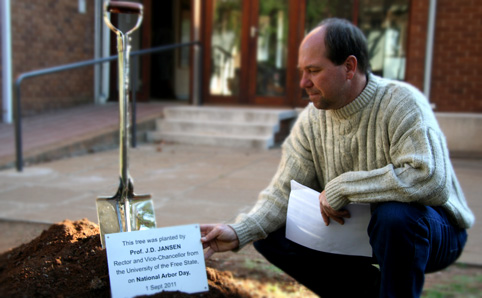|

|
|
Gerard Hoogendoorn from Physical Resources at the hole for the jacket plum tree that was planted on our Bloemfontein Campus on National Arbour Day.
Photo: Anja Aucamp
|
Prof. Jonathan Jansen, Vice-Chancellor and Rector, planted the jacket plum tree (Pappea capensis) on our Bloemfontein Campus during an event.
According to Mr Gerard Hoogendoorn from our Department of Physical Resources this hardy, evergreen tree, which reaches a height of between two and eight metres, is a worthy addition to any garden; for bird life as well as fauna. “Planting a tree has a positive influence on our green heritage,” he said.
Prof. Jansen, who started his study career as a botanist, said that he loves anything green. “Trees with their roots remind me of our university rooted in a rich past. Trees, with their new leaves once a year, also reminds me of the transformation of our campus and our country. Young people compare with the trunks of the trees that link the past (roots) with the future (leaves). South Africa’s future depends on you young leaders,” he said.
The tree-planting initiative is one of the universities sustainability initiatives to make staff as well as students aware of protecting their environment, amongst others.